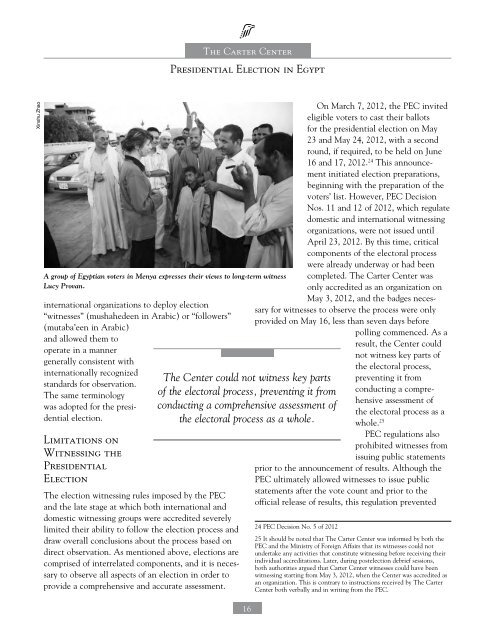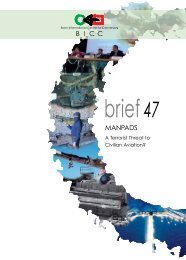egypt-final-presidential-elections-2012
egypt-final-presidential-elections-2012
egypt-final-presidential-elections-2012
Create successful ePaper yourself
Turn your PDF publications into a flip-book with our unique Google optimized e-Paper software.
The Carter Center<br />
Presidential Election in Egypt<br />
Xinshu Zhao<br />
A group of Egyptian voters in Menya expresses their views to long-term witness<br />
Lucy Provan.<br />
international organizations to deploy election<br />
“witnesses” (mushahedeen in Arabic) or “followers”<br />
(mutaba’een in Arabic)<br />
and allowed them to<br />
operate in a manner<br />
generally consistent with<br />
internationally recognized<br />
standards for observation.<br />
The same terminology<br />
was adopted for the <strong>presidential</strong><br />
election.<br />
Limitations on<br />
Witnessing the<br />
Presidential<br />
Election<br />
The election witnessing rules imposed by the PEC<br />
and the late stage at which both international and<br />
domestic witnessing groups were accredited severely<br />
limited their ability to follow the election process and<br />
draw overall conclusions about the process based on<br />
direct observation. As mentioned above, <strong>elections</strong> are<br />
comprised of interrelated components, and it is necessary<br />
to observe all aspects of an election in order to<br />
provide a comprehensive and accurate assessment.<br />
The Center could not witness key parts<br />
of the electoral process, preventing it from<br />
conducting a comprehensive assessment of<br />
the electoral process as a whole.<br />
On March 7, <strong>2012</strong>, the PEC invited<br />
eligible voters to cast their ballots<br />
for the <strong>presidential</strong> election on May<br />
23 and May 24, <strong>2012</strong>, with a second<br />
round, if required, to be held on June<br />
16 and 17, <strong>2012</strong>. 24 This announcement<br />
initiated election preparations,<br />
beginning with the preparation of the<br />
voters’ list. However, PEC Decision<br />
Nos. 11 and 12 of <strong>2012</strong>, which regulate<br />
domestic and international witnessing<br />
organizations, were not issued until<br />
April 23, <strong>2012</strong>. By this time, critical<br />
components of the electoral process<br />
were already underway or had been<br />
completed. The Carter Center was<br />
only accredited as an organization on<br />
May 3, <strong>2012</strong>, and the badges necessary<br />
for witnesses to observe the process were only<br />
provided on May 16, less than seven days before<br />
polling commenced. As a<br />
result, the Center could<br />
not witness key parts of<br />
the electoral process,<br />
preventing it from<br />
conducting a comprehensive<br />
assessment of<br />
the electoral process as a<br />
whole. 25<br />
PEC regulations also<br />
prohibited witnesses from<br />
issuing public statements<br />
prior to the announcement of results. Although the<br />
PEC ultimately allowed witnesses to issue public<br />
statements after the vote count and prior to the<br />
official release of results, this regulation prevented<br />
24 PEC Decision No. 5 of <strong>2012</strong><br />
25 It should be noted that The Carter Center was informed by both the<br />
PEC and the Ministry of Foreign Affairs that its witnesses could not<br />
undertake any activities that constitute witnessing before receiving their<br />
individual accreditations. Later, during postelection debrief sessions,<br />
both authorities argued that Carter Center witnesses could have been<br />
witnessing starting from May 3, <strong>2012</strong>, when the Center was accredited as<br />
an organization. This is contrary to instructions received by The Carter<br />
Center both verbally and in writing from the PEC.<br />
16



